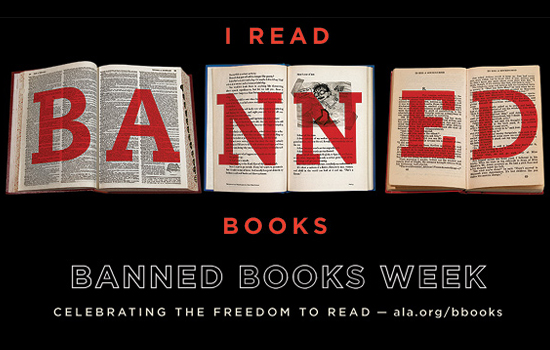The first week of October is one of my favorites. I love the coming of fall, Halloween, and pumpkin spice lattes at Starbucks. I also love the idea of an entire week dedicated to celebrating reading–and not just any reading, but the reading of banned books. I’ve never been much of a rebel, but this week is definitely one that even makes me want to break the rules.
When I was growing up, all I did was read. My grandpa taught me how when I was two and a half, and I just never stopped. My mom always laughed at the fact that when she made me go outside to play, I would grab a book and go read outside instead.
My favorite series, without a doubt, was the Harry Potter series. I had never been into science fiction or fantasy books, but those stories made me believe in magic. As a kid, they brought my mom and I together. We would read a chapter aloud from them every night. When the movies came out, we’d go see them together. Reading the stories became a bonding experience for us. As I grew older, I read a lot of books, but always came back to Harry Potter when I wanted to read something I knew I would love.
One summer, while my siblings and I were still pretty little, we went to work with my mom. (Sidebar: she was a single parent, and she worked in a church, so we were able to spend the day there with her.) As usual with those days, I brought along a book to read. The fifth Harry Potter book had just come out, and I was about to finish. Naturally, that book came with me everywhere.
When we got to the church, I settled into my favorite chair in my mom’s office and began to read. A woman came in one day and said, “It’s so nice to see kids reading instead of playing video games! What book do you have?”
“The fifth Harry Potter book.” I responded.
The smile was instantly wiped from the woman’s face, and she turned to my mom and said, “I can’t believe you let her read those books.” Neither one of us knew what to say, so we ignored the comment. For the rest of the day, I couldn’t figure out how Harry Potter could make someone so mad. My mom explained to me that a lot of people thought that the magic and witchcraft in the book taught kids to worship Satan. In my fifth grade mind, that was one of the stupidest things I’d ever heard. Even now, my opinion hasn’t changed. The idea that a book about friendship, love, family, and bravery could be looked at so negatively really confused me.
The Harry Potter books, along with many other of my favorites including To Kill A Mockingbird, The Great Gatsby, and the sixth-grade classic Are You There God? It’s Me, Margaret, have all been challenged countless times.I’ve never really understood the reasoning people have for wanting to ban books. Even at a basic level, there’s a freedom of speech and press in this country that banning books interferes with. More than that, it’s the idea that we are creating an aversion to reading in children.
In the past year two books that have been talked about and critically acclaimed have made it to the banned books list: The Hunger Games and The Perks of Being A Wallflower. The first was banned because of the violence, the second because it’s a coming of age novel dealing with sex, homosexuality, and discusses drugs and alcohol. These are two books that young teens have actually enjoyed reading, and they are now being taught that these books are bad and shouldn’t be read. For some reason, that doesn’t seem like the best way to handle the tricky topics brought up in the books.
Books serve as conversation starters. When I was reading the Harry Potter series, my mom and I talked about them all the time. I knew magic wasn’t real, and instead I took away the lessons the author intended to be taught with her stories. One of the best things about the books for me was that it brought me closer to my mom and gave us something to bond over. I think the real issue parents have is they don’t want to discuss the topics in the books with their children. Rather than doing any actual parenting, they ban the book to make the problem go away. The book Speak, the story of a young girl who is raped, has been banned because “it glorifies drinking…and premarital sex.” For some reason, I don’t believe a story about a girl who has to deal with such a tragedy glorifies sex in any way. Parents just don’t want to talk to their children about such a difficult topic.
Rather than get rid of the problem, parents should want to have discussions with their children. They are smarter than their parents give them credit for. We need to be encouraging children to read and play an active part in their education. Instead of banning books, we need to focus on the issues. Parents need to take advantage of the fact that the tricky issues have already been presented to the child. The hard part is over, and all they have to do is make themselves available to discuss and most importantly, listen.
Discover more from UCWbLing
Subscribe to get the latest posts sent to your email.

